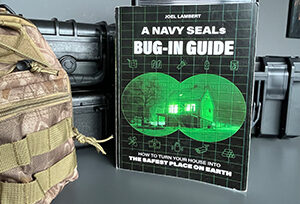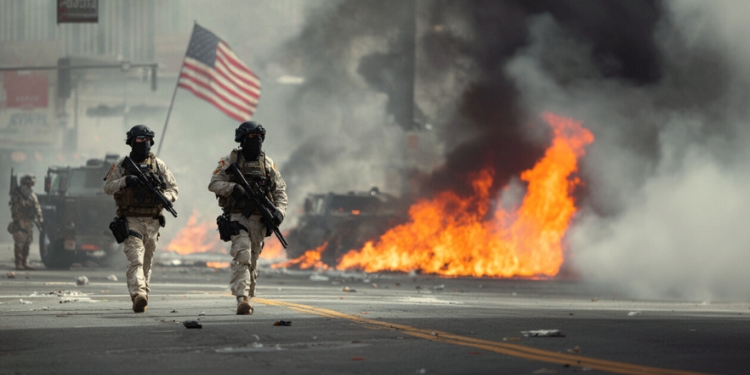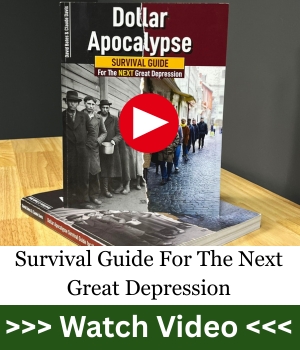The idea of martial law is unsettling, especially for those of us who cherish our God-given rights to freedom and self-reliance. When martial law is declared, the government steps in and takes control, often stripping away personal liberties under the guise of maintaining public safety.
What’s even more alarming is how close to home this possibility now feels. With the recent unrest and escalating violence in many cities, especially in Los Angeles, California, many are starting to wonder: Could martial law be declared soon? Is my state next?
While it might have once seemed like something that only happened in other countries or in distant chapters of our history, martial law has been imposed in the U.S. before – and the warning signs are becoming harder to ignore.
Under martial law, rights we take for granted – like freedom of movement, speech, and privacy – can be dramatically curtailed. For preppers and anyone who values autonomy, it’s more important than ever to understand how these changes could affect your daily life and why preparing before it happens is absolutely critical.
1. Freedom of Movement
One of the first rights to go under martial law is the freedom to move about as you please. Authorities will impose curfews and restrict travel, claiming it’s for public safety. For example, after Hurricane Katrina, residents faced strict curfews and were confined to their homes during certain hours. Roadblocks and checkpoints can be established, making it difficult to travel even short distances.
For those of us who plan to bug out or need to gather supplies, these restrictions can be a serious obstacle. Imagine needing to get essential medications or food, only to find that you can’t leave your neighborhood without facing legal consequences. This is why it’s essential to have your preparations in place beforehand. Stockpiling necessary supplies and having a solid plan can help you navigate these limitations.

Moreover, think about alternative routes and methods of transportation. Biking or walking might become more practical than driving if roads are blocked or fuel is scarce. Having a detailed map of your area and knowing the terrain can give you an advantage when official routes are restricted.
2. Freedom of Speech
Under martial law, freedom of speech is often one of the first casualties. The government will increase oversight and control over communications, suppressing dissenting voices under the pretense of preventing panic or maintaining order. Historical examples show that authorities may regulate or shut down independent media and monitor private communications.
During World War II, for instance, the U.S. government censored news and controlled information to maintain morale and national security. In more recent times, governments worldwide have limited internet access and monitored social media during periods of unrest.
For preppers who rely on information and communication, this poses a significant challenge. It’s crucial to have alternative methods of staying informed and connected, such as ham radios or encrypted messaging apps, to ensure you can receive and share vital information without undue interference. Learning how to use these tools now will put you ahead of the curve if traditional communication channels are compromised.
3. Right to Privacy
 Privacy becomes a luxury under martial law. Authorities will conduct warrantless searches and increase surveillance, all in the name of security. Your home, vehicles, and personal belongings may be subject to inspection without your consent. This erosion of privacy rights can lead to the confiscation of legally owned property and a general feeling of unease.
Privacy becomes a luxury under martial law. Authorities will conduct warrantless searches and increase surveillance, all in the name of security. Your home, vehicles, and personal belongings may be subject to inspection without your consent. This erosion of privacy rights can lead to the confiscation of legally owned property and a general feeling of unease.
For example, during the Boston Marathon bombing manhunt in 2013, law enforcement conducted door-to-door searches without warrants in some neighborhoods. While the intention was to find the suspects quickly, it raised concerns about the violation of constitutional rights.
To protect yourself, consider ways to secure your essential supplies discreetly. Keeping a low profile and safeguarding your privacy as much as possible becomes even more important during such times. This might involve hiding valuables in inconspicuous places or using everyday items to conceal your preparedness efforts.
👉 Is a 3-Letter Agency Tracking You Right Now?
4. Right to Bear Arms
The right to bear arms is an important aspect of our God-given rights, especially in the context of self-defense and preparedness. Under martial law, there are sure to be temporary regulations and additional checks under the guise of maintaining public safety. This includes suspending the sale of certain weapons and requiring additional permits. Then, depending on the party in office, these regulations will be extended to a permanent state of being.
This means that law-abiding citizens could be stripped of their ability to defend themselves just when they might need it most. During Hurricane Katrina, for instance, authorities confiscated firearms from residents, leaving many defenseless against looters and other threats.

It’s important to stay informed about your rights and to take steps to legally secure your means of self-defense before any such measures are put into place. This might include obtaining any necessary permits now and understanding the laws in your area. Additionally, consider diversifying your methods of protection, such as learning self-defense techniques or using non-lethal tools like pepper spray or tasers.
5. Due Process
Under martial law, the standard legal protections we’re accustomed to can be suspended. Authorities may detain individuals without formal charges or trials, often justifying these actions as necessary for national security. This lack of due process can result in innocent people being held indefinitely without recourse.
Historical examples include the internment of Japanese Americans during World War II, where thousands were detained without due process based solely on their heritage. Such actions serve as a stark reminder of how quickly rights can be stripped away under the pressure of fear and uncertainty.
Being aware of this possibility underscores the importance of staying vigilant and cautious. It’s wise to avoid situations that might draw unnecessary attention and to know your rights to the extent possible under such circumstances. Keeping identification and important documents accessible can help if you need to prove your identity or legal status.
6. Property Rights
Under martial law, the government may seize private property for military or emergency use. This could include your home, land, vehicles, or supplies. The justification is often for the greater good, but it leaves individuals without compensation or recourse.
For example, during wartime, governments have requisitioned factories and resources to support military efforts. In a local emergency, your property could be used as a staging area or shelter without your consent.
To mitigate this risk, it’s important to have contingency plans. Consider safeguarding critical supplies in multiple locations and having a backup plan if you need to relocate quickly. Building relationships with trusted friends or family members can provide additional options for shelter and storage.
7. Economic Rights
Martial law can lead to the government taking control over resources, including food, fuel, and even currency. Rationing systems may be put in place, limiting how much you can purchase regardless of your ability to pay. Banks might be closed, and access to funds restricted.
During the Great Depression, bank holidays were declared, preventing people from accessing their money. In more recent times, countries facing economic crises have limited withdrawals to prevent bank runs.

Having alternative forms of currency, such as precious metals or barter items, can provide a safety net. Stockpiling essential goods not only ensures your own supply but also gives you valuable items for trade if traditional currency loses value or becomes inaccessible.
Why Being Prepared Matters Now More Than Ever
The potential loss of these rights highlights why self-reliance and preparedness are so critical. By taking proactive steps now, you can better protect yourself and your loved ones if martial law is ever declared. This includes:
Stockpiling Essential Supplies
Ensure you have enough food, water, and medical supplies to sustain you without needing to rely on restricted systems. Aim for at least several months’ worth of provisions. This is a resource that will prove extremely useful, as it teaches you how to turn your household into a 100% self-sufficient stronghold – an absolutely crucial skill in any crisis situation.
When it comes to water, there’s one device every prepper should know about: a backpack-sized water generator that pulls moisture straight from the air. No rivers, wells, and no hookups needed. This game-changing invention can produce up to 40 gallons of clean water per day… and it could be a lifesaver when the taps run dry.
Securing Alternative Communication and Protecting Your Privacy
Invest in tools like ham radios or satellite phones to stay informed and connected outside of mainstream channels. Learn how to use them effectively. Keep your preparations discreet to avoid unwanted attention or potential confiscation. Use privacy measures like encrypted communication and be cautious about sharing information.
Understanding Your Rights
Stay informed about your legal rights and any changes that occur, so you’re better prepared to navigate them. Knowledge is power, and being aware can help you make better decisions.
Building Community
Connect with like-minded individuals who value self-reliance and can offer support during challenging times. A strong network can provide resources, information, and assistance when you need it most. A great example of a group that has survived centuries of hardship completely on their own is the Amish community.
 For over 200 years, they’ve lived independently right here in America, including Eddie Swartzentruber, the author of The Amish Ways Book. I strongly recommend you uncover their secrets and learn how to break free from the grid and eliminate your vulnerabilities—before it’s too late
For over 200 years, they’ve lived independently right here in America, including Eddie Swartzentruber, the author of The Amish Ways Book. I strongly recommend you uncover their secrets and learn how to break free from the grid and eliminate your vulnerabilities—before it’s too late
Financial Preparedness + Mental and Emotional Readiness
Keep some wealth in physical forms like cash, precious metals, or valuable goods. Diversify your assets to protect against banking restrictions. Saving money can feel like a real burden – especially now, when everything seems to be going downhill financially.
But if you want to get by with less, take a page from the same Amish community and start cutting down your living costs today. That way, you can focus on what truly matters: the safety and well-being of your family.
Also, you must prepare yourself mentally for the challenges that may come. Stress, uncertainty, and fear can take a toll, so developing resilience is key.
One More Thing
It’s obvious that terrible things will happen when martial law goes into effect. Even if you’ve done nothing wrong… even if you love this country with all your heart… under martial law, you and your family could still be treated like criminals. That’s the terrifying truth most Americans aren’t ready to face.
 That’s why preparation is your only line of defense. You need supplies and a plan. More than anything, you need the kind of knowledge that can keep your family alive when the system turns against you.
That’s why preparation is your only line of defense. You need supplies and a plan. More than anything, you need the kind of knowledge that can keep your family alive when the system turns against you.
That’s where A Navy SEAL’s Bug-In Guide by Joel Lambert comes in. This book delivers hard-earned lessons from a man who knows what real danger looks like. Inside, you’ll learn exactly how to fortify your home, outthink desperate intruders, and protect your loved ones when help isn’t coming.
Here are just a few of the critical survival tactics this guide reveals – secrets thousands of American families are already using to prepare for the unthinkable:
- Must-Have Survival Foods You Didn’t Know Existed
- What Item You Should Remove from Your Pantry Immediately
- How to Harvest Atmospheric Water
- How to Make Your House Invisible After SHTF
- What Hiding Places Looters Never Check
- Powerless Items to Stockpile for the Next Blackout
- How You Can Stockpile Prescription Meds Without a Prescription
- What You Probably Forgot to Buy at the Dollar Store
Final Thoughts
While we hope that martial law is never imposed, being prepared is a prudent step toward safeguarding your freedoms. By understanding the potential impact on your rights and taking action now, you can maintain a greater degree of autonomy and resilience no matter what the future holds.
Remember, preparedness i’s about peace of mind. In uncertain times, those who have taken the time to prepare will be better positioned to protect themselves and their loved ones. Embrace self-reliance, stay informed, and continue building the skills and resources that will help you navigate any challenges that come your way.
It can be incredibly difficult to just get going sometimes, and prepping is no exception. It’s vital to get past any obstacle that’s holding you back from genuinely starting the necessary crisis preparations. Time isn’t on your side. Discover how to beat procrastination, your worst enemy, by accessing this link.
You may also like:
7 Hidden Signs That Martial Law Will Be Declared
The First Remedies That Will Disappear In A Crisis (Video)
How The State Will Strip You Of Your Rights When SHTF























Howdy from high in the desert swamp,
After reading through this and you have doubts? Maybe the AAP staff will attach the article on EO’s from a week or two back? If you don’t live in a hurricane prone area you may not believe this will happen. It already has. Road blocks get set up to screen for actual residents, authorized help, clergy and very few others. If you remember reading the Grapes of Wrath and know history, California set up check stations and refused entry to Okies wanting to come in. Idaho has already set a precedent on water control. They denied usage to generational potato farmers and allowed unlimited access to a new start up mining company. This is and has been real scenarios and actual events. This is a very good article to get you thinking on the trust issue. Who will that be? The government? Your State? Your county? Your neighbor? Who?
If you are new to this line of thought, it can be difficult to conceive starvation and mass shortages. If you have family born in the 40’s or even 30’s get them to talk about making due with what you have or have stored. I still remember, being born in the Missouri Ozarks in 1961, little girls wearing flour or seed sack dresses. They were well made, clean and had a giant flower on the front from the company. I also remember people having outhouses and hard packed dirt floors in their home. One light bulb in the middle of the room. Franklin stoves heating the house and being the place to cook. We have become so accustomed to point and click we/I forget I was the TV remote control. Dad yelled and I changed the channel. My suggestion is, take a few minutes to look at your comfort and what is truly necessary. Not a want. Necessary. Start there. What do I need if I cannot leave my immediate area? Need, not want. That’s later.
Clean water will make a criminal out of people. Find a way to get water, clean it and store it. You don’t have to go back in history far and see North Carolina has happened before because people, well intentioned, trusted the Government instead of themselves with God.
Remember the Alamo
Remember 9-11
Remember North Carolina
Remember to have your soul prepared
Awesome comment! I too currently live in the Missouri Ozarks, born and raised! I’m a 1976 model but as a child we still had an outhouse for a time. Life was so much simpler back then. So ready for Jesus’ return but I know it will probably have to get worse than it already is before that happens. Being prepared is vital… both in the physical but even more importantly as you said SOUL PREPARED!!
OK, of course I have to agree totally with Chaplain Dan as we are of like minds… I’m fortunate to reside in my BOL, but it was only 2 1/2 yrs ago I resided in the DFW Metromess… I luckily found the semi perfect location back in my East Texas AO… This article should be a reminder, if not a wakeup call to some.. Pay heed, and prepare is about all I have to say… Remember the Alamo was already stated by Chaplain Dan, so I’ll close with Gig Em Ags, and Live Long and Prosper…
Hi Poppy…do you have a decoder ring for your comments for idiots like me…because i would really like to know what you are trying to say….or is that on purpose? For some reason smart people like to use big words….not to say some obscure letters are big but dang…….
It’s…..o k …..i will hopefully figure it out correctly…..☮
We are sure you figured it out correctly.
It made perfect sense to me.
Ya …my mind reading is taking a while to kick in now days….
my mind says….bug out location….
Ok what’s DFW
Internet says…….Dallas-Fort Worth…..now AO…..
Area of operations.
Gig em Ags is gig em Aggies. The fight motto of Texas A&M.
Area of operations.
Gig em Ags is gig em Aggies. The fight motto of Texas A&M.
My mind says…..you have to be from Texas to know what that means…Im glad i vented that out of my system…in front of millions….written in eternity
Oh….Thanks Gator…
I don’t know why that posted twicet.
Sorry about that
I know how you feel…..Sometimes my I phone thinks it knows better than me what I am trying to text..Something to do with the matrix i guess
Don’t worry about it, it happens!
Remember under the UCMJ (civil law suspended) is French/Roman based, where you are considered guilty and you must prove your innocence.
But on the plus side, Article 31 encapsulates many but not all your Miranda Rights. If they arrest you, they are supposed to read you your Art. 31 sheet.
You’re right that under the Uniform Code of Military Justice (UCMJ), civil liberties operate differently than in the civilian legal system, and it’s true that due process may feel more constrained. However, while the UCMJ has roots influenced by European legal traditions, it still upholds a presumption of innocence, despite the more hierarchical and expedited nature of military proceedings. Article 31 does offer protections similar to Miranda Rights, including the right to remain silent and to be informed of the nature of the accusation, which is a crucial safeguard. Still, under martial law, especially when applied broadly, the consistency of these protections can vary depending on the authority enforcing them, making the erosion of rights a serious concern.
HAHAHAHA THE ORANGE S*** STAIN IS ALREADY REMOVING YOUR RIGHTS THROUGH HIS AUTHORITARIAN BULLS***.
Lap it up people, this is what you voted for.
Is anyone a good ****.
Hi Lisa….Long time no see….so who do you want to be president of the U.S.A.?
Don’t worry he’s a lame duck President…maybe you should run for president in the democratic party….you have a good start at checking the boxes as far as qualifications….
Shooting U.S.citizens without a trail is kind of weird …a little 3rd world….a crime here in the U.S You might get lucky and get a demacrate bought and payed for judge…but i would not want to count on that now…..if i was you i would turn grey and hide in the shadows
Oh Oh, I must have missed it – what “rights” have I lost in the last 6 months?
You are a white man, you lost no rights. In fact, you gained the right to discriminate more in some situations. It is others who lost rights. Of course you do not care or look at that.
Marshal Law does not have to be nation wide or even state wide.
It can be for a targeted area.
Well we are getting close to martial law because of those protests and riots, and trumps political nonsense. He’s already attacking due process and is allowing ICE to unconstitutionally enter homes without a warrant, and let’s them hide their identities so you cannot even identify they are even real agents.
And no, before ya’ll start, I am NOT a liberal, I’m libertarian. I do not like how this is going, even though I approve of some of what he is doing. But this nonsense? No. F*** no. Agree or don’t, I don’t care.